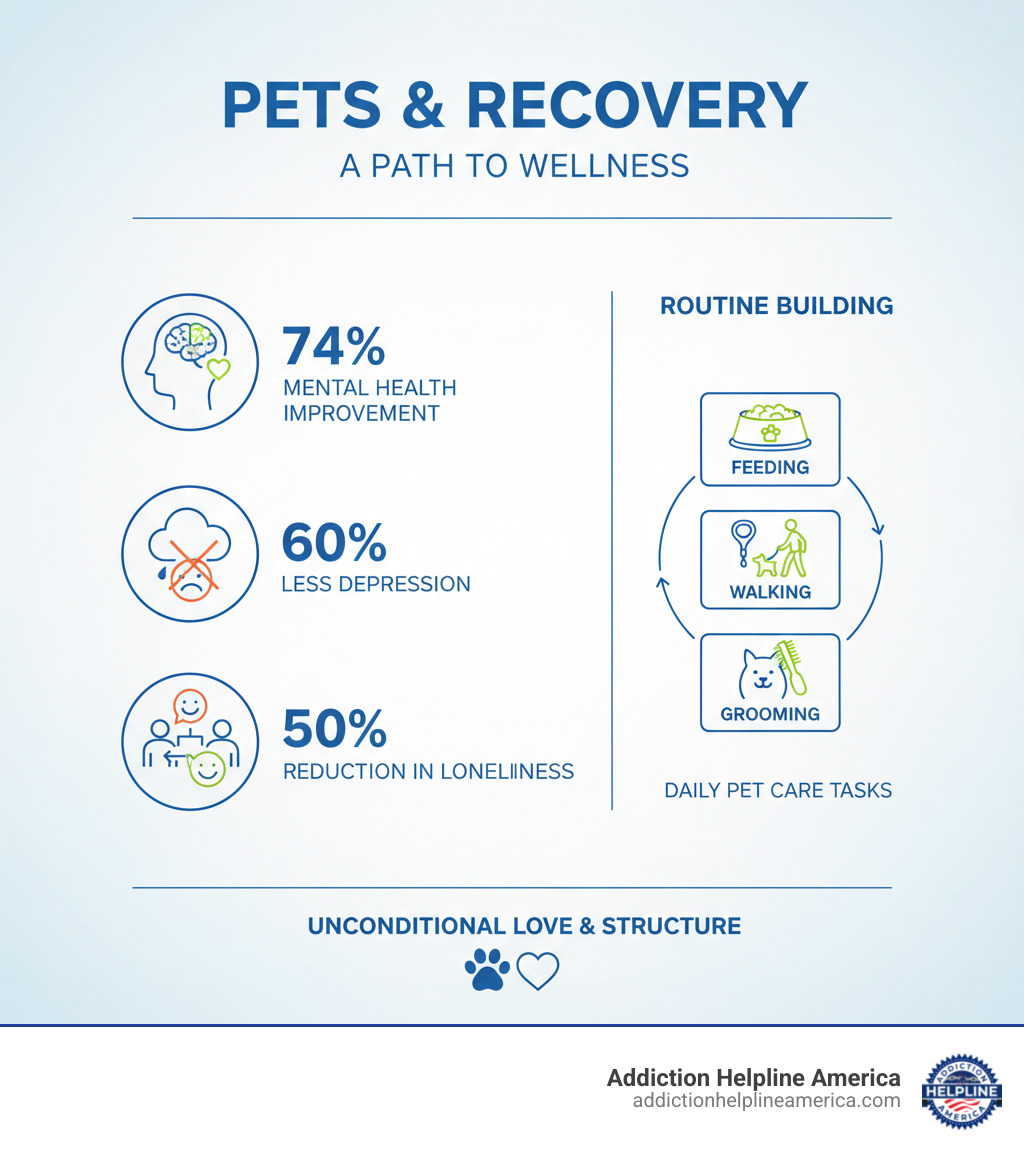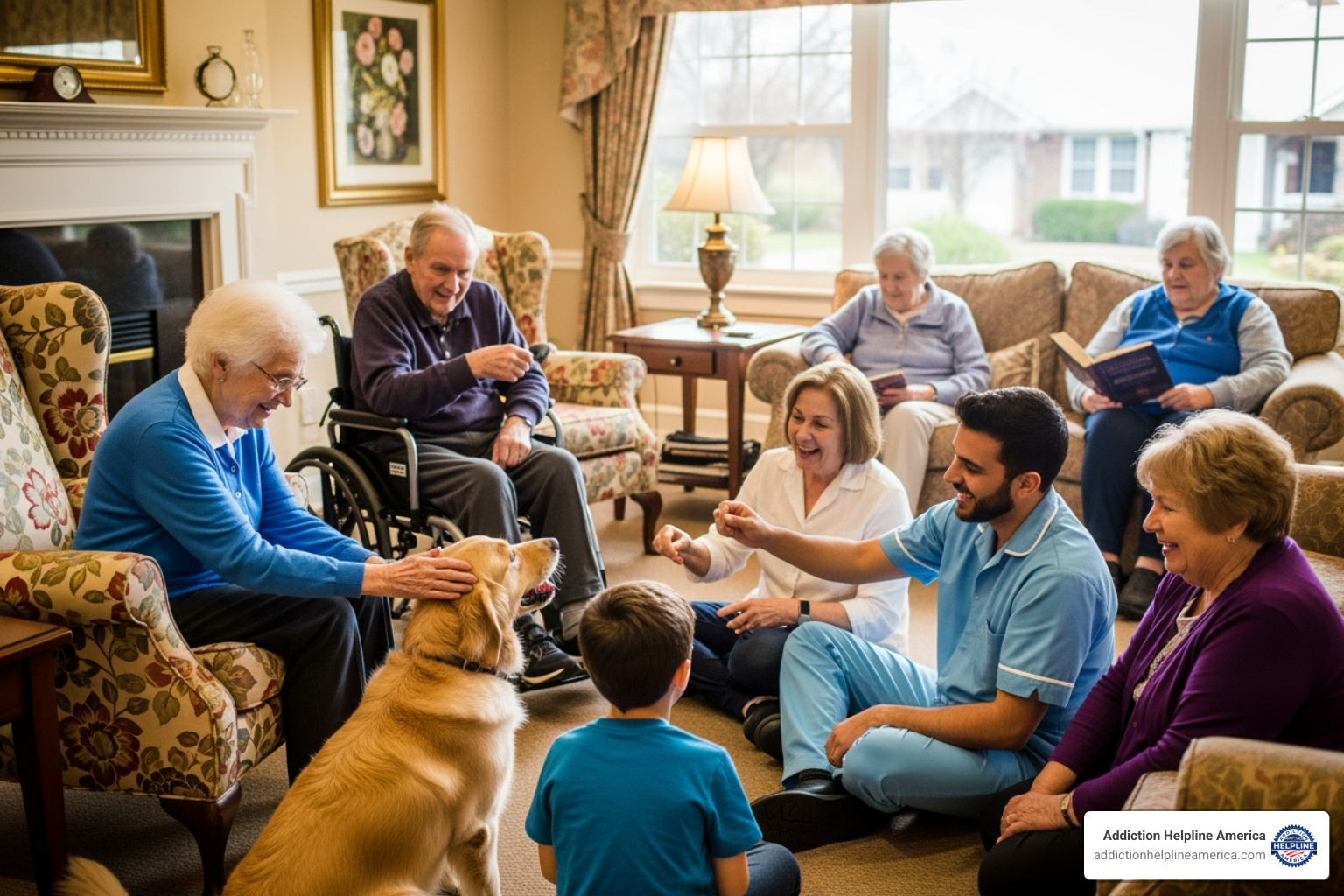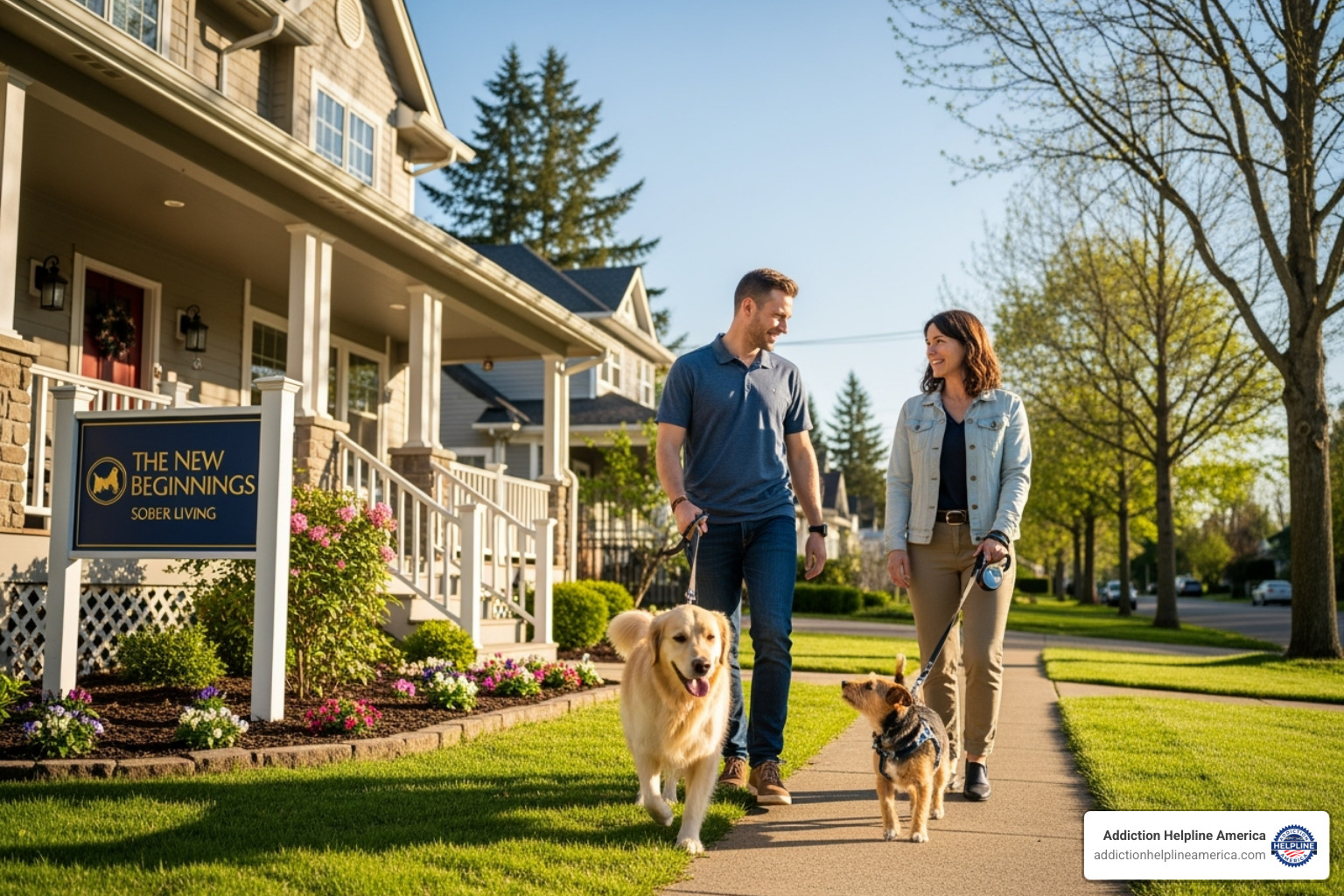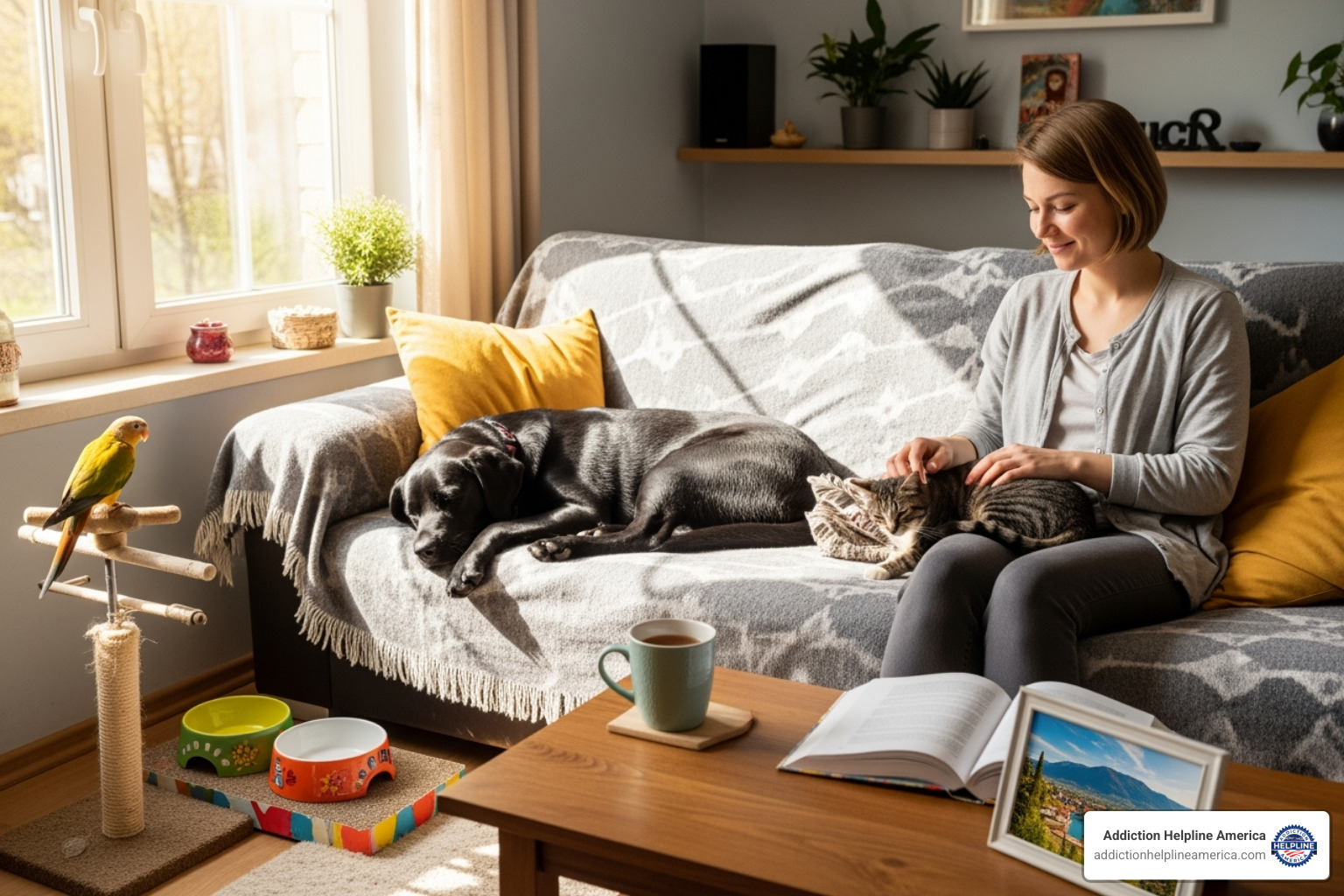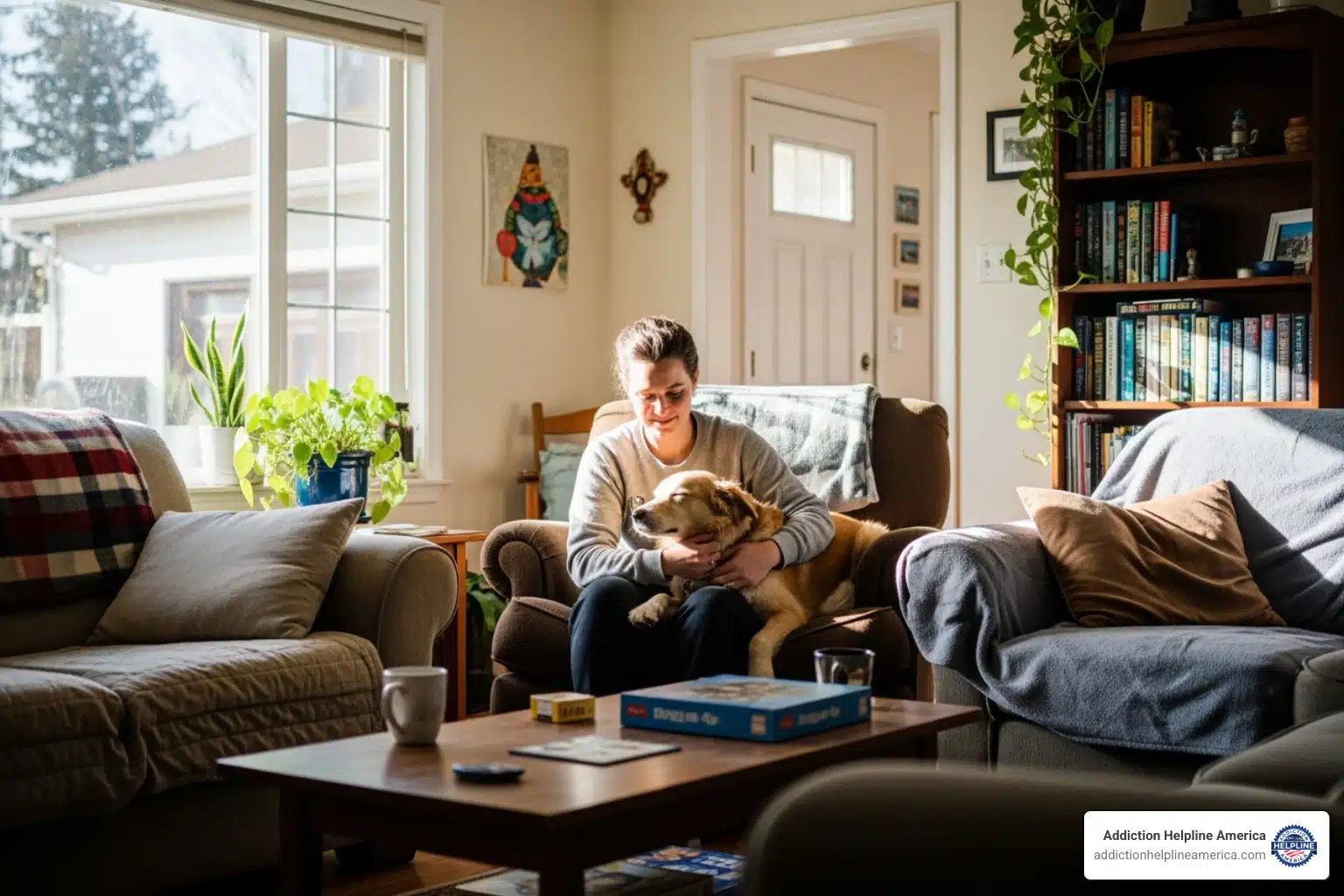
Why Pet-Friendly Sober Living Can Make All the Difference
Finding sober living that allows pets can be key to a successful recovery for those who consider their furry companions family. Here’s what you need to know about these specialized sober living options:
Quick Facts About Sober Living That Allows Pets:
- Mental Health Benefits: 74% of pet owners report improved mental health after acquiring a pet
- Types of Pets: Most facilities allow dogs, cats, and caged animals (fish, birds)
- Common Restrictions: Age limits (typically 2+ years), weight limits (often under 30 lbs), spaying/neutering required
- Costs: May include pet deposits or monthly fees ranging from nominal to moderate amounts
- Availability: Growing number of facilities nationwide, though still limited compared to standard sober living
The recovery journey is personal. For many, pets are not just companions—they’re emotional support systems, daily motivators, and family members. Leaving a beloved pet behind while seeking help for substance use can feel overwhelming and may become a significant barrier to treatment.
Research shows the powerful therapeutic benefits of the human-animal bond. Studies indicate that pet owners are 60% less likely to suffer from depression and experience an over 50% reduction in feelings of loneliness. For individuals in early recovery, these mental health benefits are crucial for maintaining sobriety.
Pet-friendly sober living homes recognize this vital connection, offering accommodations that allow residents to keep their companions during this critical transition. These facilities understand that caring for a pet can provide structure, responsibility, and unconditional love—all essential for a successful recovery.
At Addiction Helpline America, we’ve helped countless individuals find appropriate recovery housing, including specialized options like sober living that allows pets. Our experience shows that removing barriers to treatment, such as pet separation anxiety, significantly improves engagement and long-term outcomes.
The Healing Power of Pets: Why Pet-Friendly Recovery Matters
Coming home to a wagging tail or a gentle purr after a difficult day can mean the world to someone in recovery. The human-animal bond offers comfort and stability that is especially precious during the vulnerable early stages of sobriety.
Sober living that allows pets recognizes this powerful connection. Your pet isn’t just an animal; they’re family. Having them by your side during recovery can make all the difference in your healing journey.
The science backs this up. Research from the Human-Animal Bond Research Institute shows that 74% of pet owners experience improved mental health after bringing an animal into their lives. For someone navigating addiction recovery, these benefits are often essential for success.
Beyond emotional support, pets contribute to better physical health, increased emotional stability, and reduced relapse risk. They offer unconditional love and non-judgmental companionship, which is why pet-friendly recovery environments are so important.
Easing the Transition into Recovery
One of the biggest problems people face when considering treatment is the heartbreaking thought: “What will happen to my dog?” or “Who will take care of my cat?” This worry can create so much stress that some people delay getting the help they need.
Sober living that allows pets removes this barrier. When you don’t have to choose between your recovery and your companion, you can focus your energy on getting better. The peace of mind from knowing your furry friend is safe with you is invaluable.
This isn’t just about feeling better; it’s about staying in treatment. Studies show that when people feel more motivated and less stressed about their living situation, they’re more likely to stick with their recovery program. Research has found that pet owners often feel more driven to attend therapy and maintain sobriety because they know their animal depends on them.
At Addiction Helpline America, we’ve seen how addressing every aspect of a person’s life—including their cherished pets—leads to better outcomes. For more information on finding supportive recovery residences, visit our resource page.
Mental and Emotional Support System
Pets have an almost supernatural ability to sense when you’re having a tough day. They don’t judge or lecture; they just offer their quiet, steady presence. During recovery, when emotions can feel overwhelming, this unconditional love and companionship becomes incredibly powerful.
The numbers tell an amazing story. Pet ownership can reduce feelings of loneliness and depression by over 50%. According to the CDC, pet owners are 60% less likely to suffer from depression. That’s a life-changing difference.
When you pet a dog or hear a cat purr, your body increases production of serotonin and dopamine—the feel-good chemicals that boost happiness. At the same time, stress hormones like cortisol drop significantly. Your blood pressure goes down, your heart rate slows, and you start to feel calmer.
Imagine finishing a challenging therapy session, feeling emotionally drained. Instead of walking into an empty room, you’re greeted by excited barks or gentle head bumps. That simple moment can shift your mood and remind you that you’re not alone.
Building Routine and Accountability in Recovery
Recovery thrives on structure, and pets are natural teachers for building healthy routines. Your dog still needs their morning walk, even on a bad day. Your cat won’t let you sleep in when it’s breakfast time. These daily pet care tasks create a framework that keeps you moving forward, even when motivation is low.
Feeding schedules, daily walks, grooming, and playtime become anchors in your day. This consistent responsibility helps build the discipline and accountability that successful recovery requires. Focusing on another living being’s needs naturally pulls you out of your own head and into positive action.
Research in Frontiers in Veterinary Science highlights how dogs, in particular, contribute to feelings of safety and provide a calming presence. The sense of purpose from caring for your pet builds self-worth and reinforces the positive habits essential for long-term sobriety.
Pet care teaches selflessness in small, manageable ways. Instead of being consumed by cravings or negative thoughts, you’re focused on making sure your companion is happy and healthy. This shift in perspective aligns perfectly with recovery principles.
Fostering Community and Social Connections
Pets are the ultimate conversation starters. In a sober living that allows pets, your furry friend becomes a natural bridge to connecting with other residents. You might bond with someone over dog training tips or a shared love for rescue cats. These shared interests create genuine friendships that go beyond just talking about recovery.
Group activities emerge naturally when pets are part of the community. Park visits become social events, and morning dog walks turn into informal support sessions. These interactions happen organically, without the pressure of forced social activities.
Reduced isolation is a key benefit of these pet-centered connections. Walking your dog with a housemate helps build the peer support network crucial for long-term recovery. It’s often easier to open up to someone when you’re both focused on keeping your dogs from tangling their leashes.
These connections can become some of the strongest relationships formed during recovery. There’s something special about people who understand both the challenges of sobriety and the joy of loving an animal. This combination creates bonds that can last well beyond your time in sober living.
How to Find and Choose a Sober Living That Allows Pets
Finding the right sober living that allows pets can feel challenging, but with the right approach, you can find a supportive environment where both you and your furry friend can flourish. The key is knowing where to look and what questions to ask.
While pet-friendly recovery housing is still somewhat limited, more facilities are recognizing the healing power of the human-animal bond. This means your search, while requiring patience, is likely to yield positive results.
Steps to Find a Sober Living That Allows Pets
Start with targeted online strategies using specific search terms like “pet-friendly sober living near me,” “recovery housing allowing pets,” or “pet-friendly halfway house.” Online directories often specify pet policies, saving you time.
Don’t overlook referrals from treatment professionals. Your therapist, counselor, or treatment provider likely has connections with various sober living facilities and can offer personalized recommendations.
12-step groups and peer networks can be goldmines of information. Members often have experience with different facilities and can share honest insights.
Consider facilities that follow National Alliance for Recovery Residences (NARR) standards. While NARR doesn’t specifically certify for pet-friendliness, their standards indicate a commitment to quality care. You can contact NARR-certified residences to inquire about their pet policies.
Key Questions to Ask Before Choosing a Home
Once you’ve identified potential facilities, it’s time to dig deeper. A quality sober living that allows pets will welcome your questions.
Start with the basics: what types of pets are allowed? Most welcome dogs and cats, but policies vary on caged animals. Some may have restrictions on specific breeds due to insurance.
Size, weight, and age limits are common. Many facilities prefer pets over two years old and under 30 pounds, but this varies. Most require spaying or neutering for communal harmony.
Financial considerations are crucial. Ask about pet deposits, monthly pet rent, or maintenance fees to avoid surprises.
Inquire about pet amenities and practical considerations. Are there fenced yards or designated outdoor areas? How close are veterinary services? What are the house rules on leashes, noise, and supervision?
Shared living dynamics matter. Ask how other residents feel about pets and if the facility has protocols for handling allergies or conflicts. Understanding the staff’s philosophy on pets in recovery provides valuable insight.
Finally, ask about consequences and responsibilities. What happens if your pet causes problems? What are your daily responsibilities? Clear expectations help everyone succeed.
Potential Challenges and Considerations
While pet-friendly sober living offers tremendous benefits, being aware of potential challenges helps you prepare.
Allergies among residents are a common concern. Quality facilities often have protocols like designated no-pet areas or careful roommate matching. Open communication with management usually resolves these situations.
Pet behavior issues can disrupt the peaceful environment. Facilities expect pets to be well-behaved, house-trained, and socialized. Address any behavioral challenges before moving in.
Additional pet fees can add up, so factor these into your budget. Breed and size restrictions exist at many facilities due to insurance or space limitations. Be honest about your pet’s specifications.
Shared living space conflicts can arise. Clear house rules and mutual respect among residents help minimize issues like noise or furniture use.
Finally, prepare your pet for the move. A new environment can be stressful. Bringing familiar toys, bedding, and maintaining routines can help your companion adjust.
Rules and Responsibilities in a Pet-Friendly Sober Home
When you choose sober living that allows pets, you’re joining a community built on mutual respect and shared responsibility. These homes understand your pet is family but must also ensure all residents can live together harmoniously.
These rules aren’t just about keeping the peace; they mirror principles that make recovery successful: accountability, routine, and respect for others. Following these guidelines becomes part of your recovery journey.
What Types of Pets Are Typically Allowed?
Not every pet is suited for communal living, so sober living that allows pets has guidelines on which animals fit best.
Dogs and cats are the most common companions. Many homes also accept smaller caged animals like fish, hamsters, or birds, as long as they are properly housed and quiet.
However, there are practical limitations. Exotic pets or animals requiring specialized care are usually not permitted, as homes aren’t equipped for their needs. Most facilities also have policies against untrained puppies or animals that haven’t been spayed or neutered to prevent behavioral issues.
Breed restrictions are common, often due to insurance requirements. Certain breeds like Pit Bulls or German Shepherds may be restricted. It’s always worth asking, as some homes evaluate pets individually.
Size and weight limits are also practical, with many homes setting limits around 30 pounds. Age requirements are typical, with a preference for pets over two years old, as they tend to be calmer and house-trained.
The spaying and neutering requirement is nearly universal, as it often leads to calmer, more social pets.
Common Rules and Guidelines for Your Companion
In a sober living that allows pets, your companion must also be a good neighbor. These guidelines help everyone focus on recovery without distractions.
- Vaccination Records: Current vaccination records are essential to protect everyone’s health.
- Leash Policies: Leashes are standard in common areas and outside to keep everyone safe and comfortable.
- Designated Outdoor Areas: Using designated spots for bathroom breaks maintains a clean environment.
- Noise Control: Excessive barking or other disruptive sounds must be managed to maintain a peaceful home.
- Pet Supervision: Pets shouldn’t be left alone for extended periods, especially if they become anxious or destructive.
- Cleaning Responsibilities: You must clean up after your pet immediately, both indoors and outdoors.
- Damage Policies: Pet owners are financially responsible for any property damage their animals cause.
Your Responsibilities as a Pet Owner in Recovery
Being a pet parent in sober living that allows pets is a rewarding part of recovery, creating structure and purpose.
- Daily Care: Daily feeding and watering become an anchor, creating a sense of purpose.
- Grooming and Exercise: Regular grooming and exercise keep your pet healthy and provide you with positive, therapeutic activities.
- Waste Cleanup: Immediate waste cleanup teaches responsibility and consideration for others.
- Financial Responsibility: Covering all pet-related expenses (food, vet care, supplies) helps you practice money management.
- Health and Behavior Monitoring: Watching your pet’s health keeps you connected to something outside yourself, developing awareness and empathy.
- Following House Rules: Adhering to all rules and ensuring your pet is well-trained teaches boundaries, respect, and community cooperation.
Frequently Asked Questions about Pet-Friendly Sober Living
When considering sober living that allows pets, it’s natural to have questions. Here are answers to the most common concerns we hear.
What if another resident is allergic to my pet?
Experienced pet-friendly facilities have systems to manage this. Most facilities handle allergies through careful planning rather than asking anyone to give up their companion.
Many homes maintain hypoallergenic residences or designated no-pet areas. House management often focuses on roommate matching, pairing pet owners with other animal lovers. Communication with house management is key; when applying, ask about their allergy protocols.
Pet owners are expected to maintain exceptional cleanliness through regular vacuuming, pet grooming, and keeping animals out of communal cooking areas. Air purifiers can also help create a comfortable environment for everyone. The goal is to find solutions where you and your pet can stay while keeping everyone healthy.
Are there extra fees for bringing a pet to a sober living home?
Yes, bringing your pet will likely involve extra costs. Most people find these fees reasonable compared to being separated from their companion.
Common expenses include a refundable pet deposit to cover potential damages and a monthly pet rent added to your regular payment. Some places may also charge maintenance fees for deep cleaning.
Cost transparency is crucial. When budgeting for pet care, remember to factor in these facility fees along with regular needs like food and vet bills. Inquiring about all costs upfront is a smart part of your recovery planning.
What happens if my pet causes problems or damages property?
Just as you’re accountable for your actions in recovery, you are responsible for your pet’s behavior. Most well-loved pets adjust beautifully to sober living.
Pet agreements will outline behavioral expectations, such as no excessive barking or aggression, and proper bathroom habits. Consequences for rule violations are also clearly defined.
You will have financial responsibility for damages, which may come from your pet deposit. In serious cases of ongoing behavioral problems, potential for pet removal exists, but this is a last resort.
Open communication with staff can prevent most problems. If you notice your pet is struggling, talk to house management right away. They often have resources or suggestions to help you both adjust successfully. The staff wants you both to succeed and will work to make the living situation viable for everyone.
Your New Beginning with Your Best Friend by Your Side
Recovery is a journey, and having the right companion can make all the difference. This guide has explored how sober living that allows pets can transform an overwhelming transition into a hopeful one.
The science is clear, and our experience confirms it: pets offer something special during recovery. The unconditional love of a furry friend doesn’t judge your past—it simply exists in the present with you. This acceptance is incredibly healing as you work to rebuild your life and self-worth.
We’ve seen how pets naturally create the structure and accountability recovery requires. Those daily walks and feeding schedules become anchors, giving you purpose and helping you develop consistent habits that support long-term sobriety. Caring for another living being can teach us to care for ourselves.
The community aspect is also vital. Pets are natural bridge builders, and we’ve witnessed countless friendships form in recovery homes over a shared love for animals.
At Addiction Helpline America, we understand that your pet is family. The thought of leaving a beloved companion behind can be a significant barrier to seeking help. That’s why we’re committed to helping you find recovery options that welcome both you and your four-legged family member.
Our nationwide network includes facilities that understand the healing power of the human-animal bond. We’ve helped countless individuals find sober living that allows pets, improving treatment retention and long-term success.
Your recovery journey is unique, and your support system should be too. Whether you’re starting your search or looking for a better fit, we’re here to provide free, confidential guidance. Finding the right environment for you and your pet is an investment in your future.
Find a personalized recovery program today – because you and your best friend deserve a fresh start together.
Our helpline is 100%
free & confidential
If you or someone you care about is struggling with drug or alcohol addiction, we can help you explore your recovery options. Don’t face this challenge alone—seek support from us.
Programs
Resources
Will my insurance
cover addiction
treatment?
We're ready to help
Find the best
drug or alcohol treatment
center
Are you or a loved one struggling with addiction? Call today to speak to a treatment expert.

